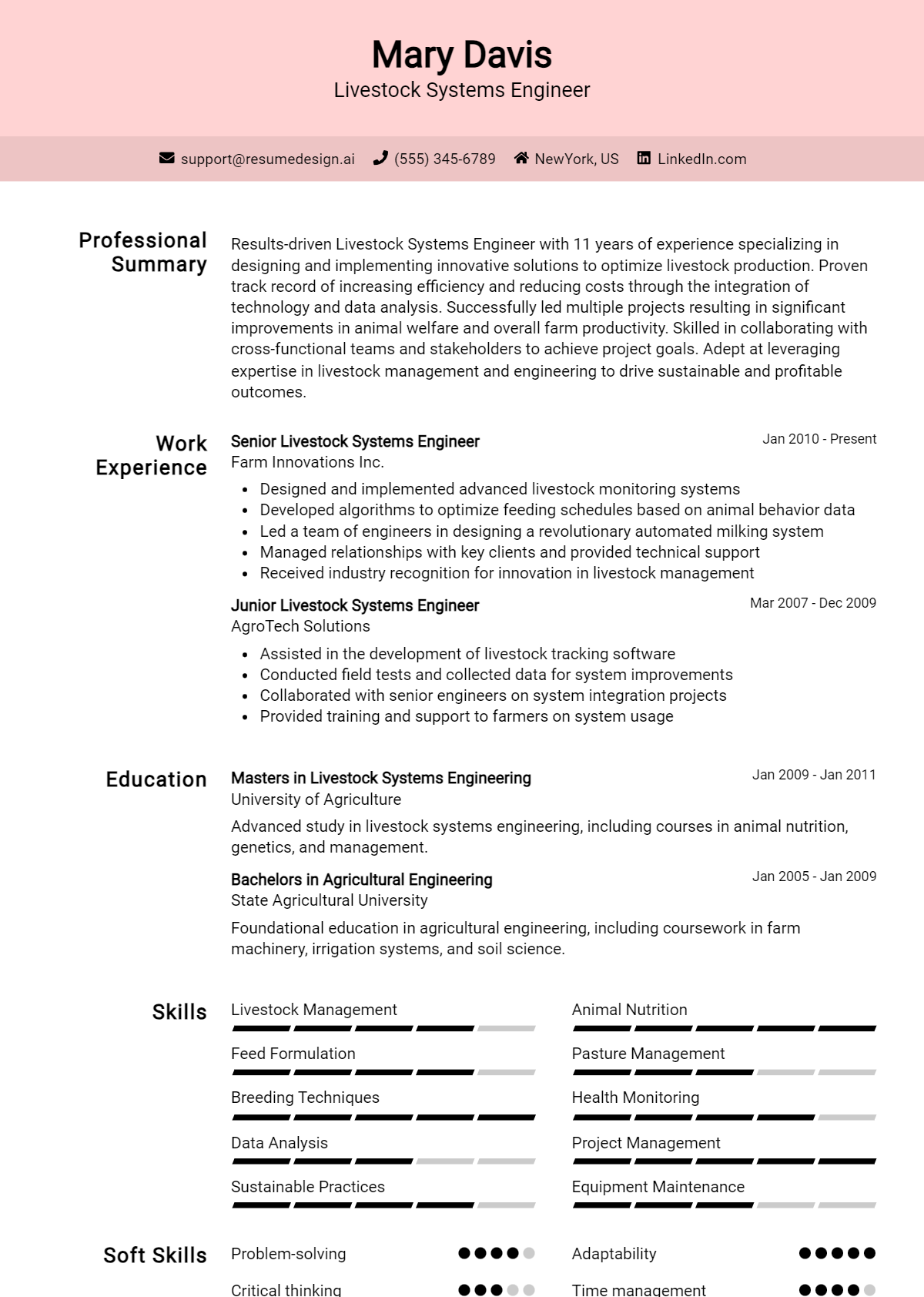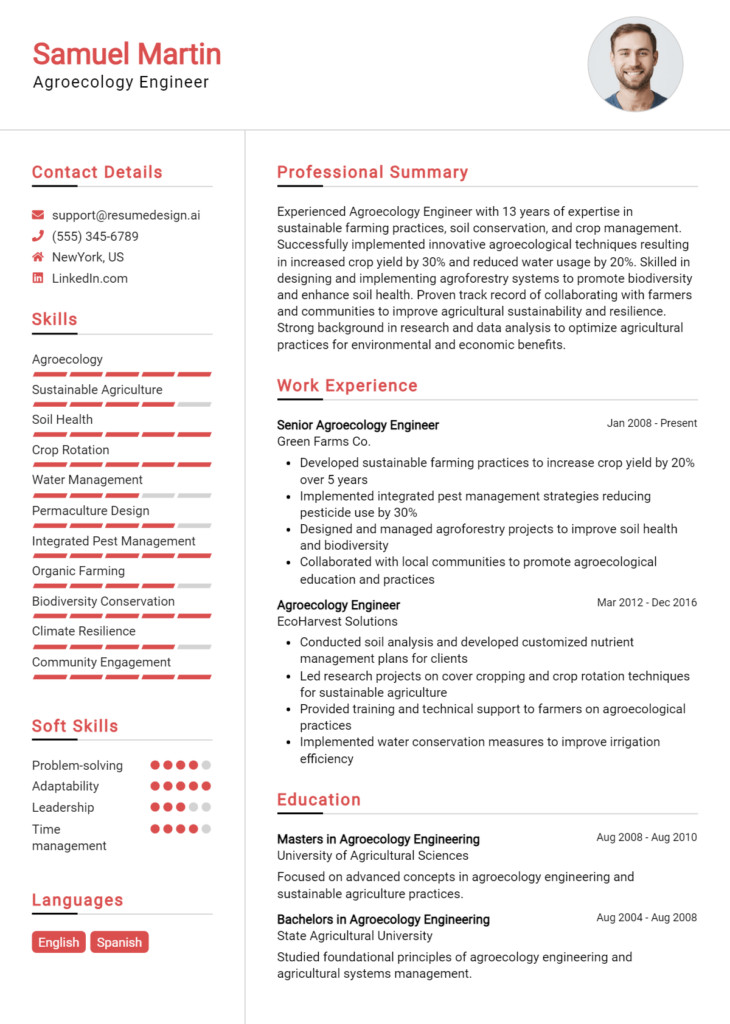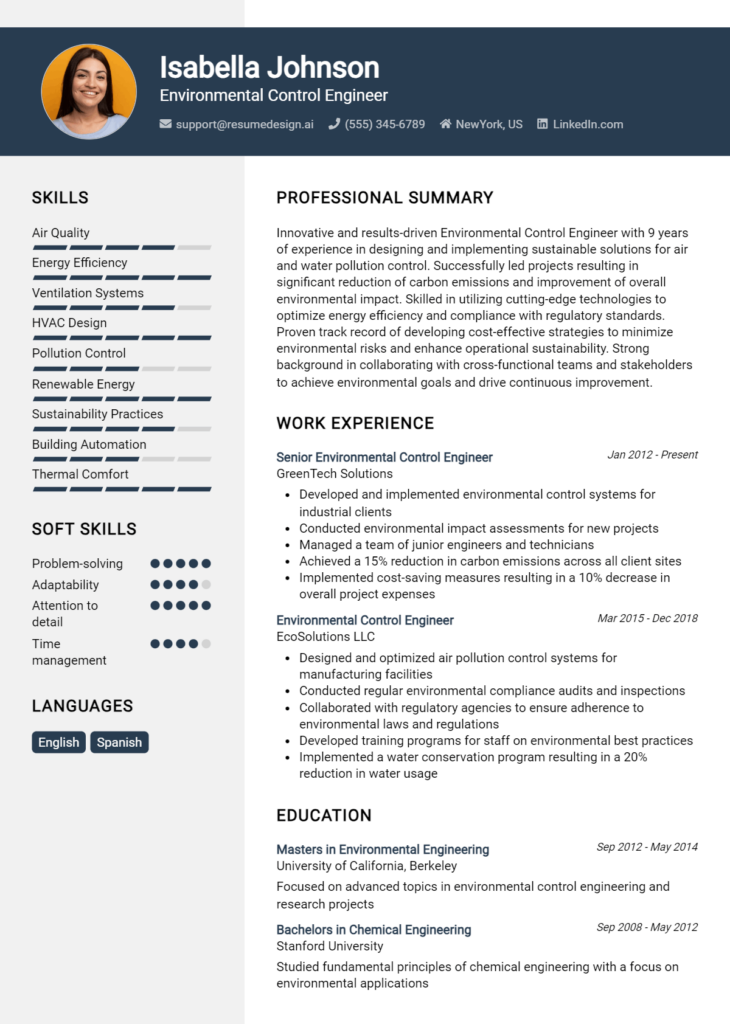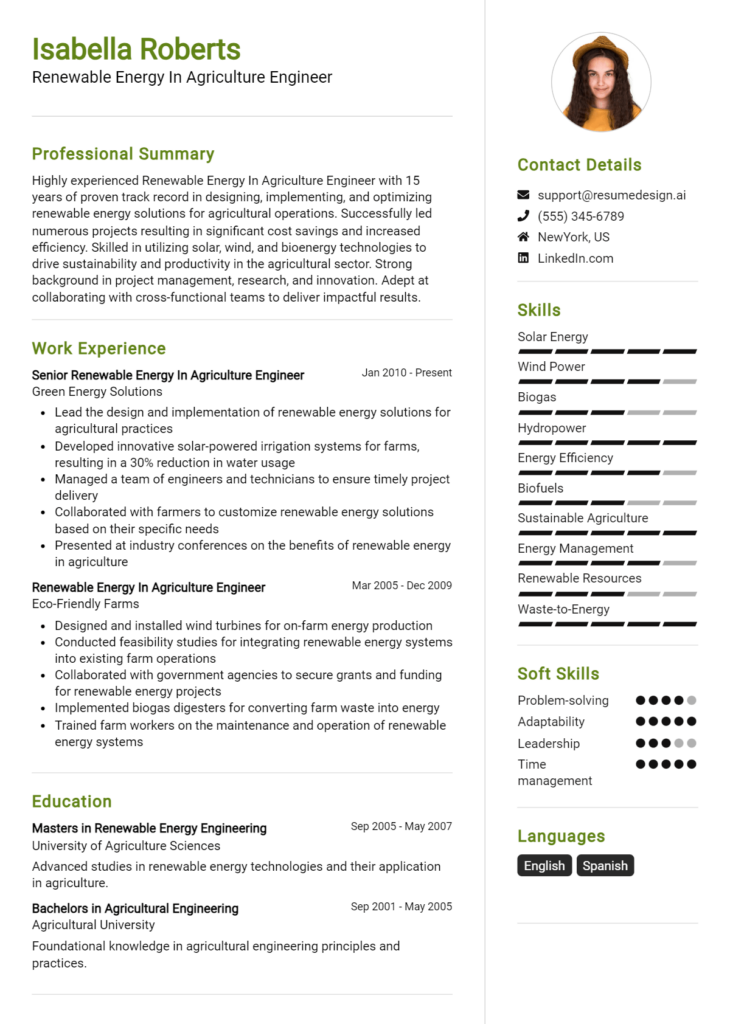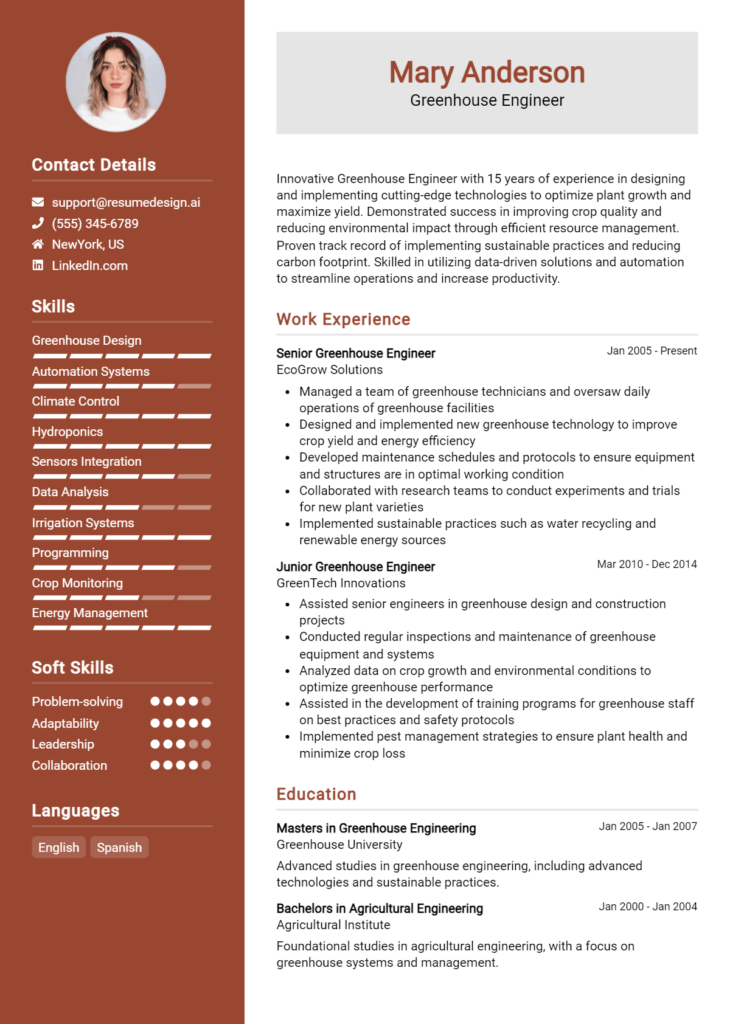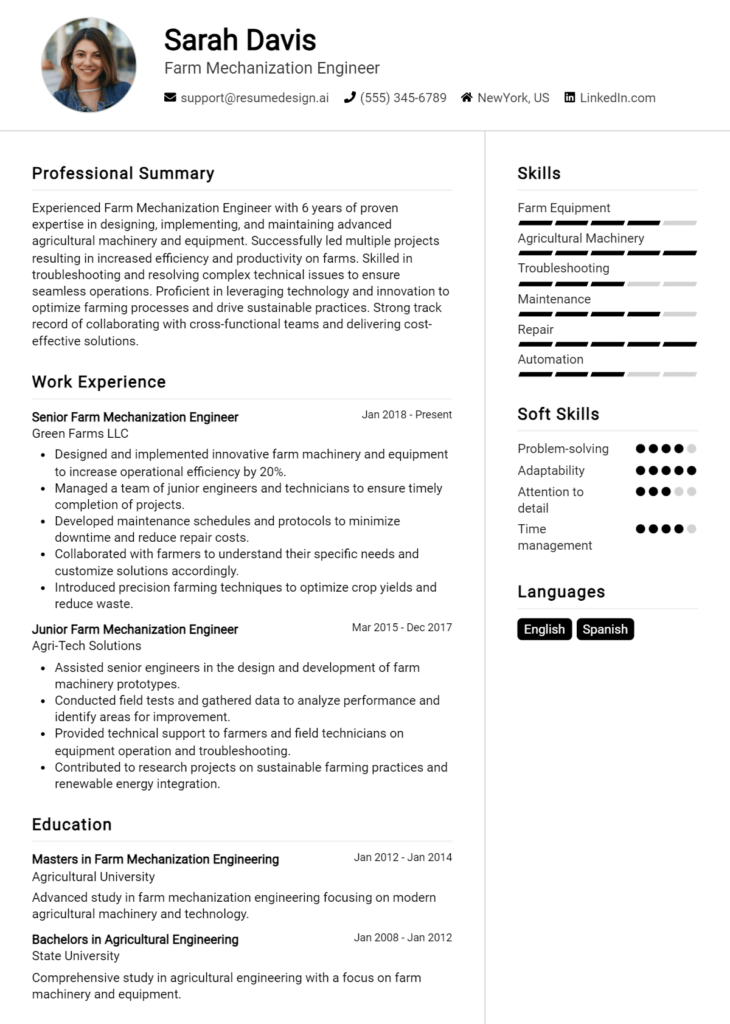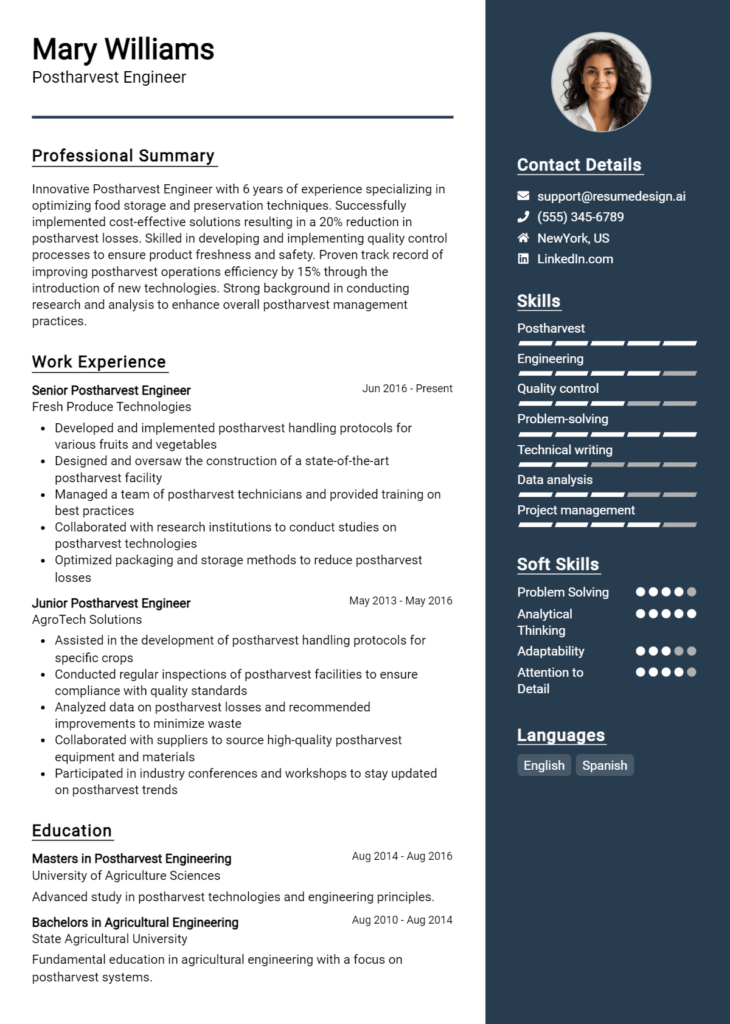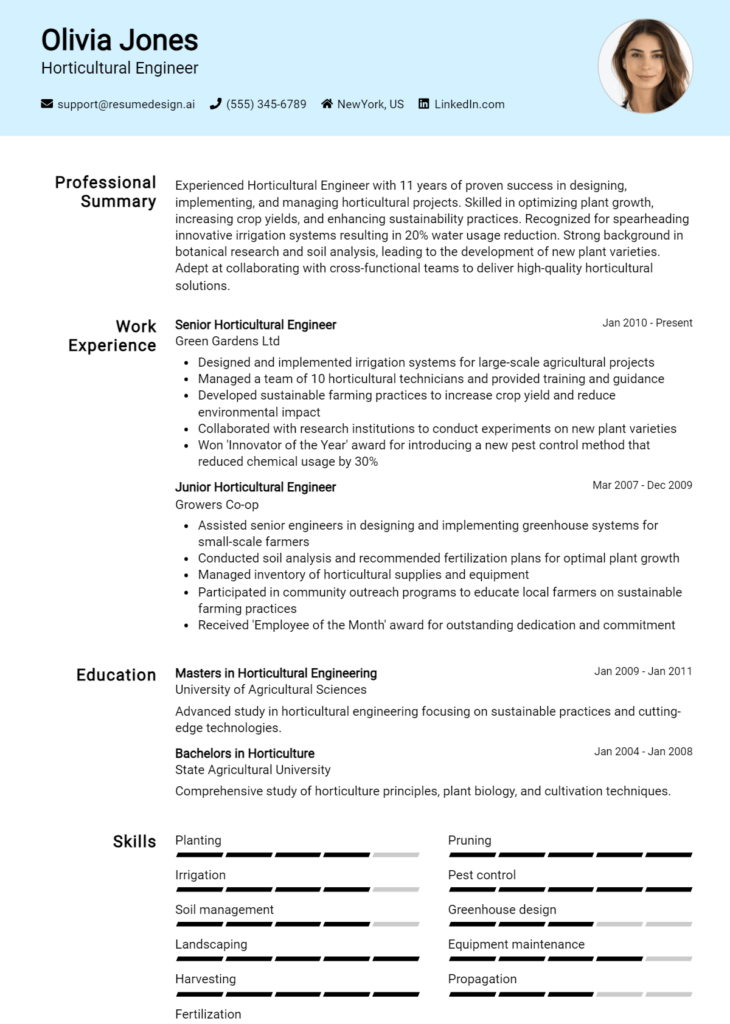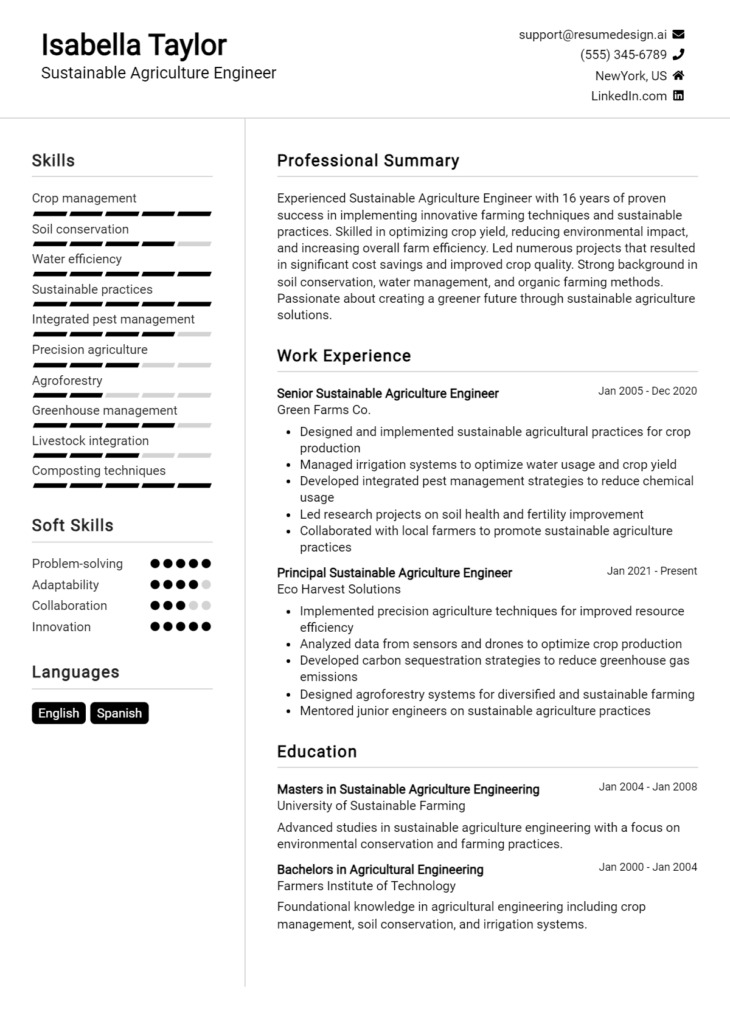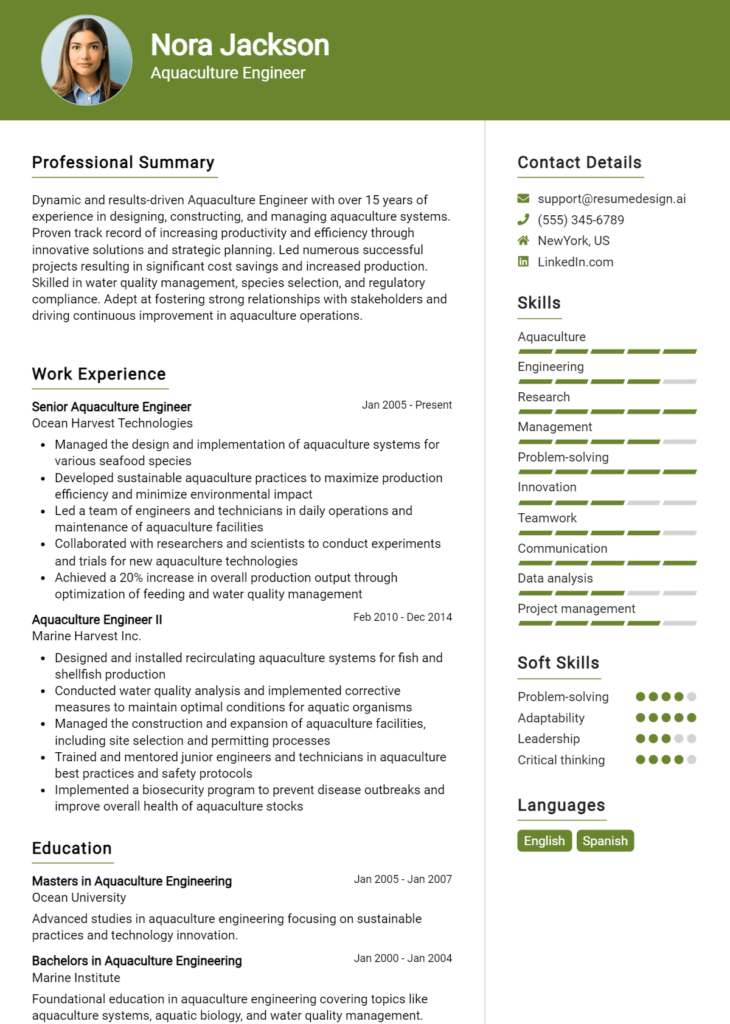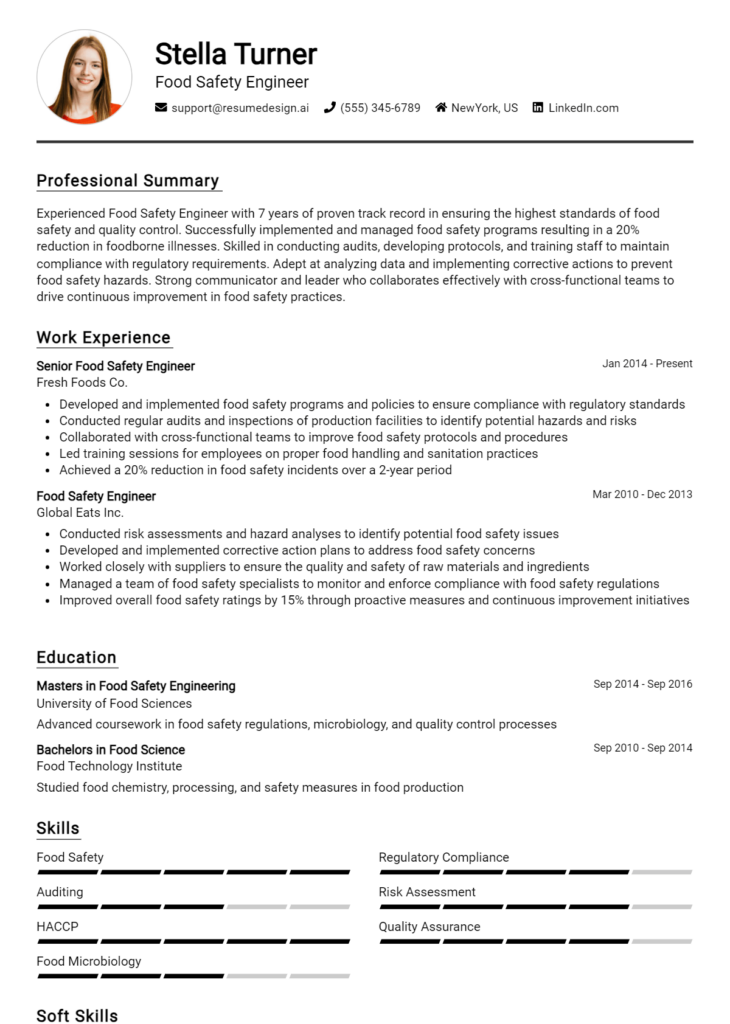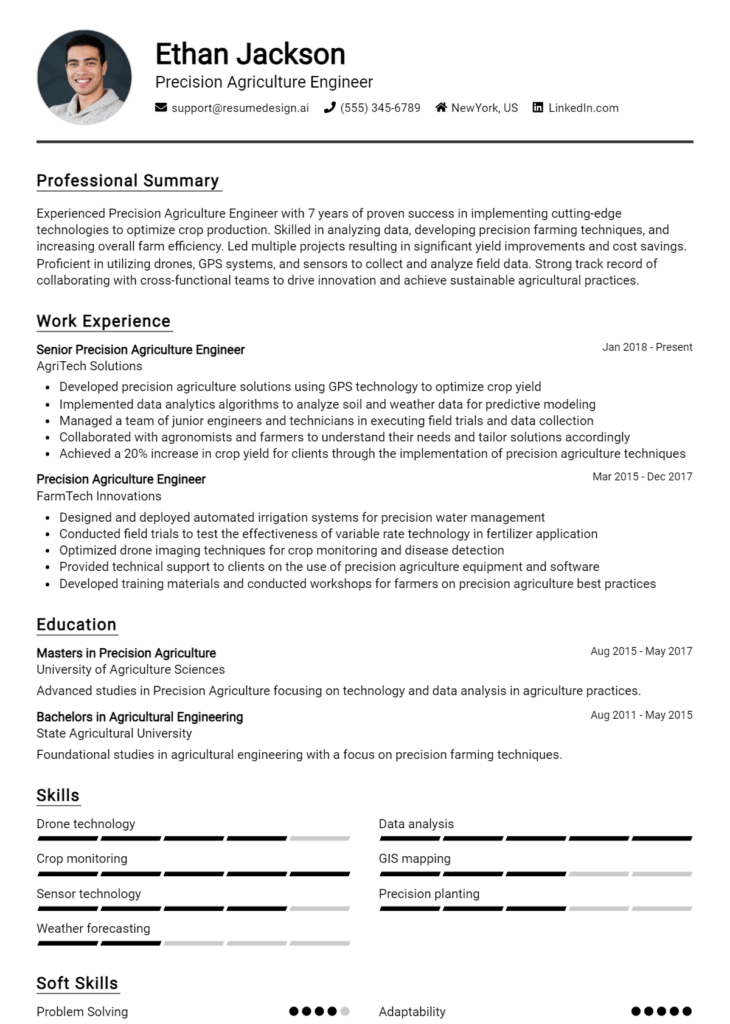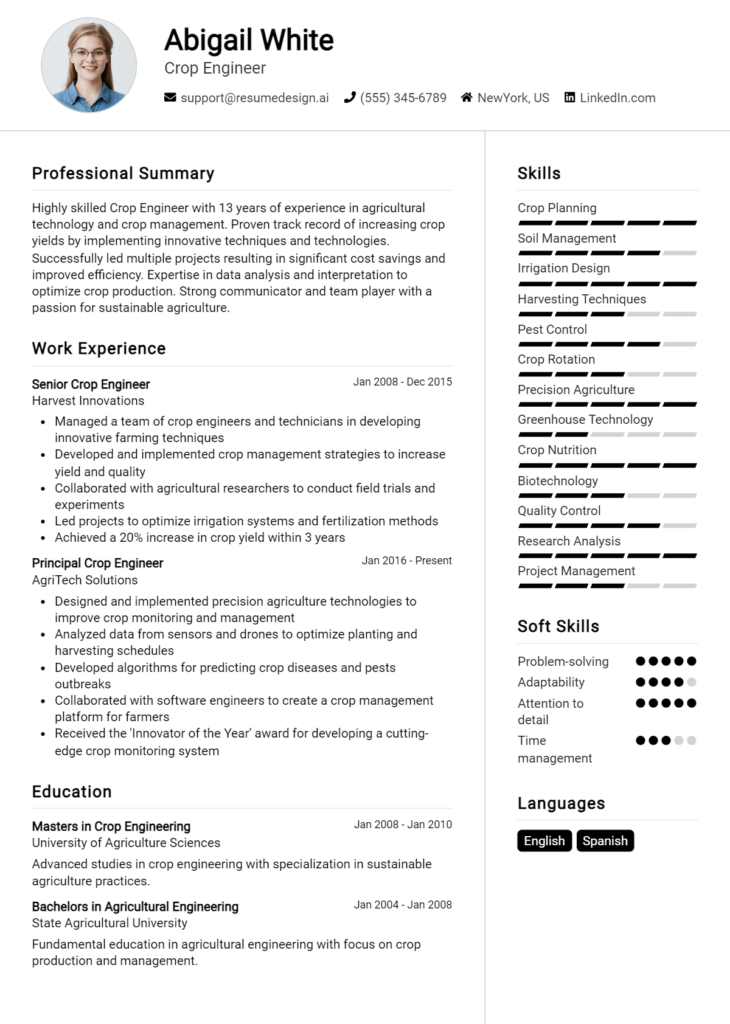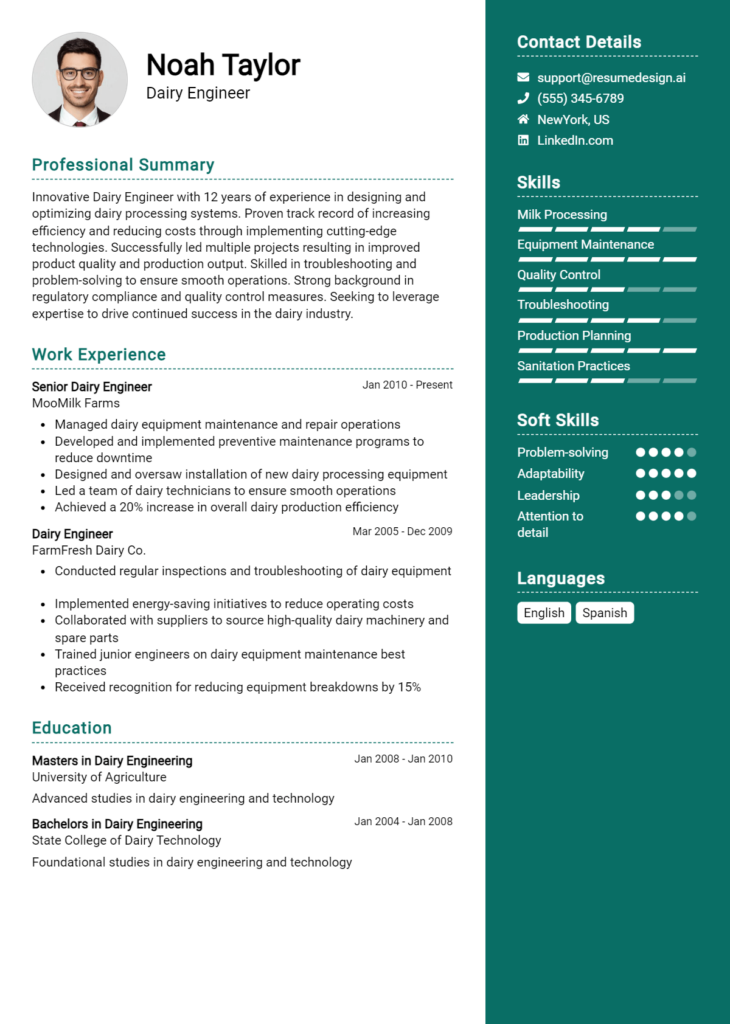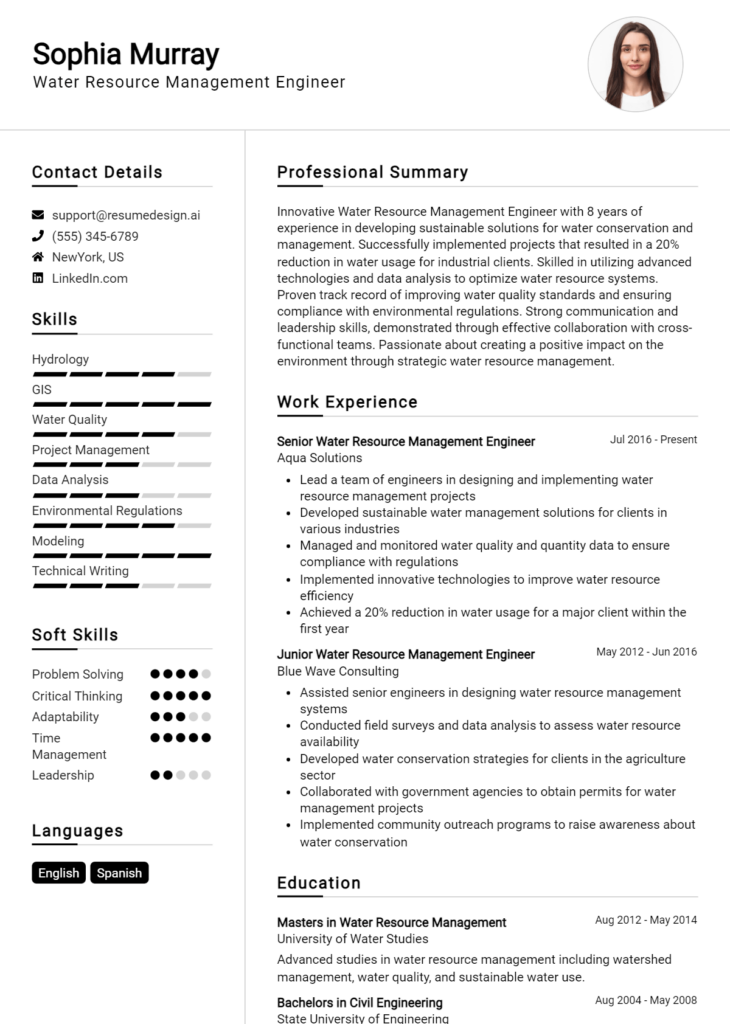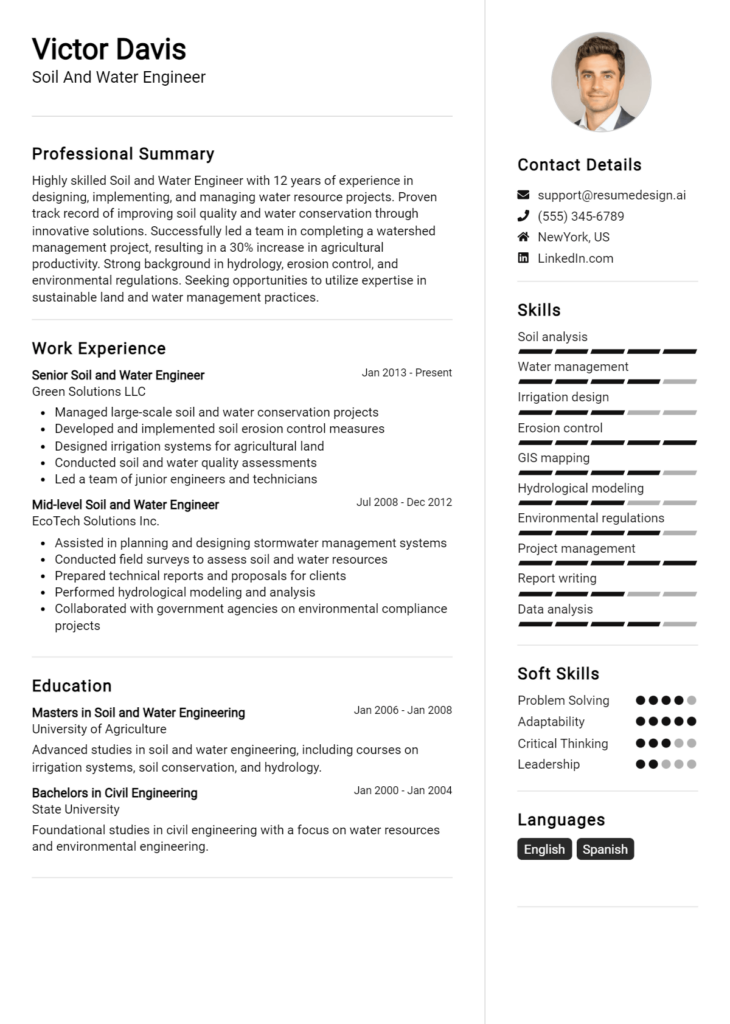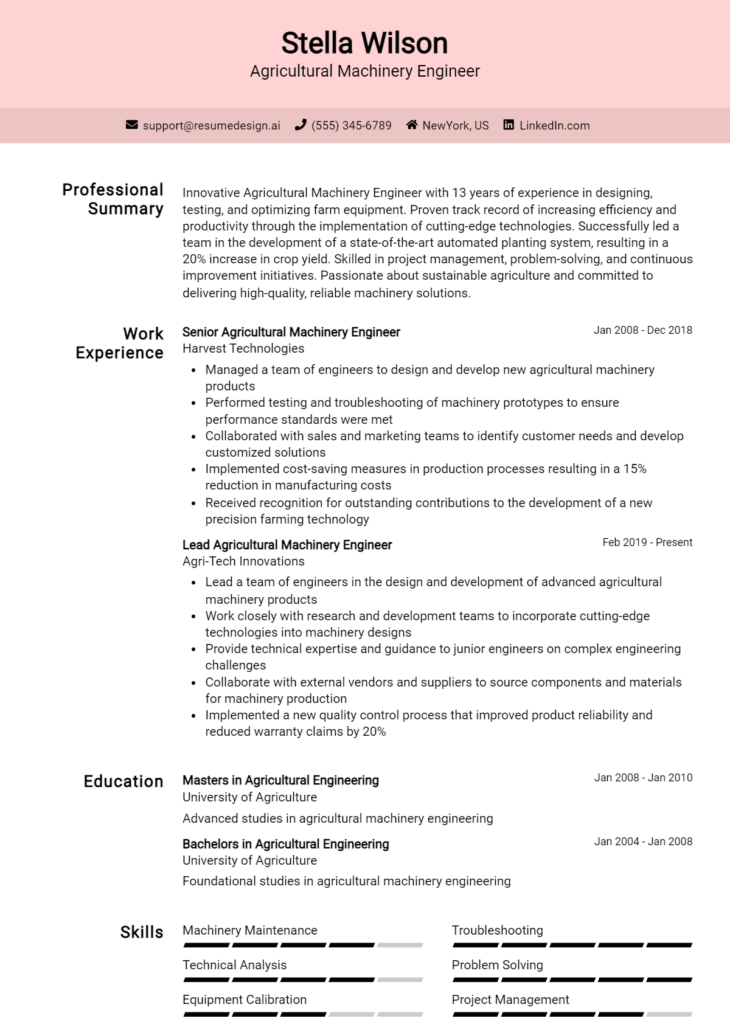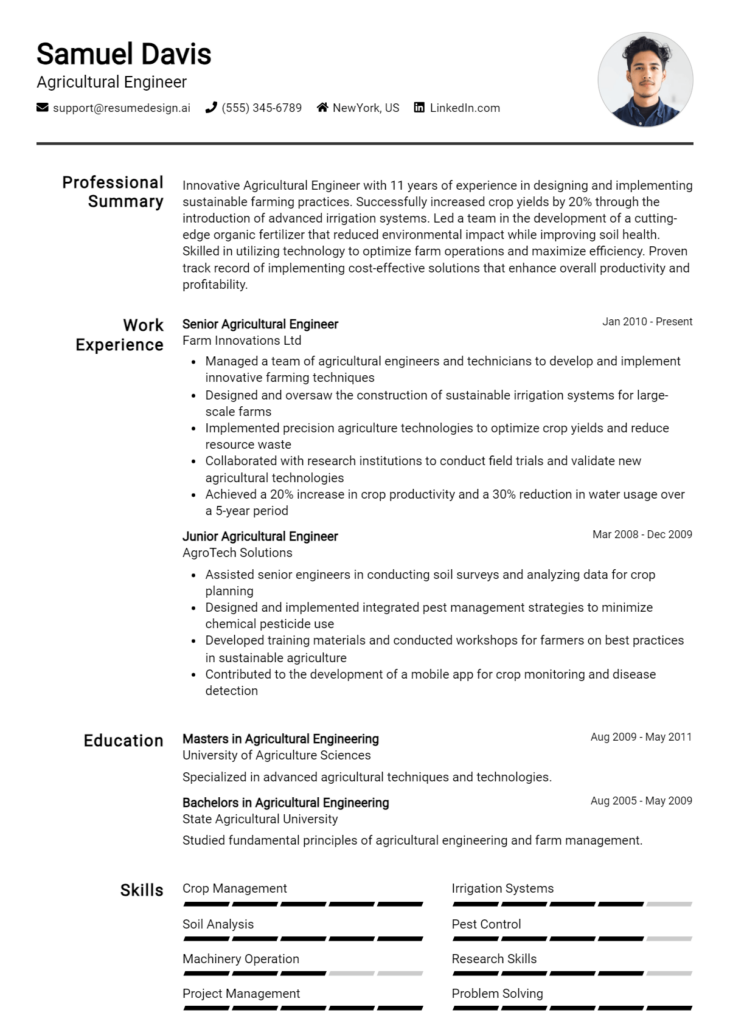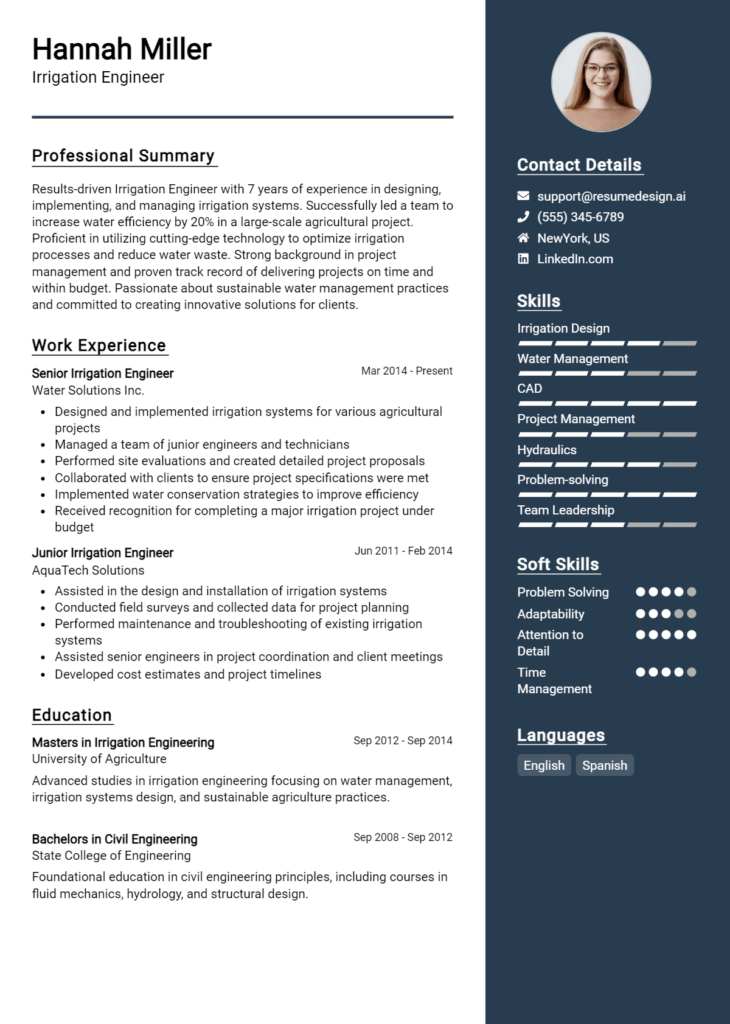Livestock Systems Engineer Core Responsibilities
A Livestock Systems Engineer plays a crucial role in integrating various departments such as genetics, nutrition, and environmental management to optimize livestock production systems. Key responsibilities include designing and implementing efficient livestock management systems, conducting data analysis for performance improvement, and collaborating with cross-functional teams to solve complex operational challenges. Technical proficiency, strong analytical skills, and effective problem-solving abilities are essential for success in this role. These skills contribute significantly to achieving the organization's goals, and a well-structured resume can effectively highlight these qualifications to potential employers.
Common Responsibilities Listed on Livestock Systems Engineer Resume
- Develop and implement livestock production systems and strategies.
- Analyze data to assess livestock performance and health.
- Collaborate with nutritionists and veterinarians to optimize animal welfare.
- Conduct feasibility studies for new technologies and systems.
- Monitor environmental impacts and regulatory compliance.
- Design and manage livestock facilities for efficiency and sustainability.
- Provide technical support and training to farm operators.
- Evaluate and select appropriate breeding programs and technologies.
- Implement biosecurity measures to prevent disease outbreaks.
- Optimize resource use and feed efficiency in production systems.
- Lead interdisciplinary teams in research and development projects.
- Prepare reports and presentations for stakeholders on system performance.
High-Level Resume Tips for Livestock Systems Engineer Professionals
In the competitive field of Livestock Systems Engineering, a well-crafted resume serves as a vital tool for standing out among other candidates. As the first impression a potential employer has of you, your resume must effectively showcase your skills, achievements, and industry knowledge. It should not only reflect your technical capabilities but also highlight your contributions to livestock management and systems improvement. This guide will provide practical and actionable resume tips specifically tailored for Livestock Systems Engineer professionals, ensuring you present yourself as the ideal candidate for prospective employers.
Top Resume Tips for Livestock Systems Engineer Professionals
- Tailor your resume to match the job description by incorporating relevant keywords and phrases.
- Highlight your technical skills in livestock systems design, data analysis, and project management.
- Showcase your relevant experience in livestock management, emphasizing any specific systems or technologies you have worked with.
- Quantify your achievements with specific metrics, such as improved livestock productivity percentages or cost savings.
- Include certifications or training related to livestock systems, such as animal health, agricultural engineering, or environmental sustainability.
- Demonstrate your ability to work collaboratively with farmers, veterinarians, and other stakeholders in the livestock industry.
- Use action verbs to describe your past roles and responsibilities, making your contributions clear and impactful.
- Keep your resume concise, ideally one to two pages, focusing on the most relevant information.
- Incorporate a summary statement that succinctly outlines your expertise and career goals in livestock systems engineering.
By implementing these tips, you can significantly enhance your resume's impact, increasing your chances of landing a job in the Livestock Systems Engineer field. A well-structured and compelling resume not only reflects your qualifications but also demonstrates your dedication and understanding of the industry, making you a strong contender in the eyes of potential employers.
Why Resume Headlines & Titles are Important for Livestock Systems Engineer
In the competitive field of livestock systems engineering, a well-crafted resume headline or title is crucial for capturing the attention of hiring managers. A strong headline can serve as a powerful first impression, summarizing a candidate's key qualifications in a succinct phrase. It should be concise, relevant, and directly related to the job being applied for, allowing the potential employer to quickly assess the candidate's suitability for the role. By clearly articulating expertise and unique selling points, a compelling headline can significantly enhance a resume's impact and increase the likelihood of securing an interview.
Best Practices for Crafting Resume Headlines for Livestock Systems Engineer
- Keep it concise: Aim for one impactful sentence that summarizes your qualifications.
- Be role-specific: Tailor the headline to reflect the specific position of Livestock Systems Engineer.
- Highlight key skills: Incorporate technical skills or areas of expertise relevant to livestock systems engineering.
- Use action-oriented language: Choose verbs that convey proactivity and effectiveness.
- Showcase relevant experience: Mention significant achievements or years of experience in the field.
- Incorporate industry keywords: Utilize terminology that resonates with hiring managers in the agricultural and engineering sectors.
- Avoid overly generic phrases: Steer clear of clichés or non-specific titles that dilute your message.
- Be authentic: Ensure the headline reflects your true capabilities and professional style.
Example Resume Headlines for Livestock Systems Engineer
Strong Resume Headlines
"Innovative Livestock Systems Engineer with 10+ Years of Experience in Sustainable Farm Management"
“Expert in Livestock Nutrition and Environmentally Sustainable Practices”
“Results-Driven Engineer Specializing in Precision Livestock Farming Solutions”
Weak Resume Headlines
“Engineer Looking for Work”
“Hardworking Professional”
Strong resume headlines are effective because they immediately convey the candidate’s specific strengths and qualifications, making it easy for hiring managers to see their potential fit for the role. In contrast, weak headlines fail to impress due to their vagueness and lack of specificity, leaving employers without a clear understanding of what the candidate brings to the table. By avoiding generic phrases and focusing on impactful language, candidates can make a memorable first impression that encourages further review of their resume.
Writing an Exceptional Livestock Systems Engineer Resume Summary
A resume summary for a Livestock Systems Engineer plays a crucial role in making a strong first impression on hiring managers. This brief yet powerful section serves to quickly capture attention by highlighting key skills, relevant experience, and notable accomplishments tailored to the specific job role. A well-crafted summary can effectively set the stage for the rest of the resume, allowing candidates to showcase their unique qualifications in a concise and impactful manner. By focusing on the most pertinent information, candidates can position themselves as ideal fits for the role, increasing their chances of landing an interview.
Best Practices for Writing a Livestock Systems Engineer Resume Summary
- Quantify achievements: Use numbers and statistics to highlight your impact and contributions in previous roles.
- Focus on relevant skills: Tailor your summary to include specific skills that align with the job description.
- Be concise: Aim for 2-4 sentences that communicate your value succinctly.
- Use industry terminology: Incorporate relevant terminology that resonates with employers in the livestock and agricultural sectors.
- Highlight key accomplishments: Mention any awards or recognitions that validate your expertise in livestock systems.
- Customize for each application: Adjust your summary to reflect the specific requirements and responsibilities of the job you are applying for.
- Showcase problem-solving abilities: Emphasize your capacity to address challenges within livestock systems engineering.
- Maintain a professional tone: Use formal language that reflects your professionalism and readiness for the role.
Example Livestock Systems Engineer Resume Summaries
Strong Resume Summaries
Dynamic Livestock Systems Engineer with over 8 years of experience in optimizing production processes, resulting in a 20% increase in herd productivity at XYZ Farm. Proven expertise in implementing sustainable practices that reduced operational costs by 15% while maintaining compliance with industry standards.
Results-driven engineer with a strong background in livestock management systems, having implemented innovative feeding strategies that improved feed conversion rates by 30%. Skilled in data analysis and predictive modeling to enhance herd health and productivity.
Accomplished Livestock Systems Engineer adept at designing and managing integrated livestock production systems. Successfully led a team that developed a new waste management protocol, reducing environmental impact by 25% and improving overall system efficiency.
Weak Resume Summaries
Experienced engineer with a background in livestock systems. I have worked in various roles but am looking for a new opportunity.
Motivated professional seeking a position as a Livestock Systems Engineer with skills in engineering and livestock management.
The examples provided demonstrate the characteristics that make them strong or weak. Strong summaries effectively convey quantifiable achievements and relevant skills, showcasing the candidate’s direct impact on previous roles. In contrast, weak summaries lack specificity and measurable results, making them generic and less compelling to potential employers. By focusing on concrete accomplishments and tailoring content to the job description, candidates can significantly enhance their resume's effectiveness.
Work Experience Section for Livestock Systems Engineer Resume
The work experience section of a Livestock Systems Engineer resume is crucial as it effectively demonstrates the candidate's technical skills, leadership abilities, and capacity to deliver high-quality products. This section serves as a platform to showcase relevant past roles, emphasizing achievements that align with industry standards. By quantifying results and illustrating successful team management, candidates can present a compelling narrative that highlights their value to potential employers. It is essential to ensure that the experience listed resonates with the technical demands of the livestock systems engineering field, as this will significantly enhance the overall impact of the resume.
Best Practices for Livestock Systems Engineer Work Experience
- Use specific, quantifiable metrics to highlight achievements and improvements.
- Tailor each experience to demonstrate relevant technical skills and competencies.
- Emphasize collaboration and teamwork in projects to show leadership capabilities.
- Incorporate industry-specific terminology to align with job descriptions.
- Highlight any certifications, tools, or methodologies utilized in past roles.
- Focus on results-driven statements that showcase problem-solving skills.
- Include a mix of individual contributions and team-based accomplishments.
- Keep descriptions concise and impactful, avoiding jargon that may confuse readers.
Example Work Experiences for Livestock Systems Engineer
Strong Experiences
- Led a cross-functional team to develop a new feed optimization system that increased livestock growth rates by 15%, resulting in a $200,000 annual cost savings.
- Implemented advanced data analytics tools to monitor herd health, reducing disease incidence by 30% over two years through proactive interventions.
- Managed the successful integration of automated feeding systems across three facilities, improving labor efficiency by 25% and enhancing overall feed utilization.
Weak Experiences
- Assisted in various projects related to livestock systems.
- Worked on improving animal health without specific outcomes or measures.
- Participated in team meetings for livestock management.
The examples highlighted as strong experiences demonstrate clear, quantifiable outcomes and showcase effective technical leadership and collaboration. Each statement provides specific metrics and results, illustrating the candidate's impact on past projects. In contrast, the weak experiences lack detail and measurable achievements, making it difficult for potential employers to gauge the candidate's contributions and effectiveness in previous roles.
Education and Certifications Section for Livestock Systems Engineer Resume
The education and certifications section of a Livestock Systems Engineer resume plays a pivotal role in establishing the candidate's qualifications and expertise in the field. This section not only showcases the academic background that forms the foundation of their knowledge but also highlights industry-relevant certifications that demonstrate their commitment to professional development. Employers seek candidates who actively pursue continuous learning, and detailing relevant coursework, certifications, and specialized training can significantly enhance a candidate's credibility and alignment with the demands of the job role. A well-structured education and certifications section can set a candidate apart in a competitive job market.
Best Practices for Livestock Systems Engineer Education and Certifications
- Focus on relevant degrees and certifications that align with livestock systems engineering.
- Include advanced degrees (Master's or PhD) if applicable, as they indicate a higher level of expertise.
- List industry-recognized certifications, such as Certified Livestock Manager or similar credentials.
- Detail any specialized training or workshops that enhance your skills in livestock management technologies.
- Provide relevant coursework that demonstrates knowledge in areas like animal science, agricultural engineering, or environmental sustainability.
- Be specific about dates and institutions to add credibility to your educational background.
- Highlight continuous education efforts, such as online courses or seminars, to show ongoing professional development.
- Avoid listing irrelevant degrees or certifications that do not pertain to the livestock systems engineering field.
Example Education and Certifications for Livestock Systems Engineer
Strong Examples
- Bachelor of Science in Animal Science, University of Agriculture, 2018
- Master of Science in Agricultural Engineering, University of Technology, 2020
- Certified Livestock Manager (CLM), National Livestock Association, 2021
- Coursework in Precision Livestock Farming and Sustainable Agriculture Practices
Weak Examples
- Bachelor of Arts in History, State University, 2015
- Certification in Graphic Design, Online Academy, 2019
- Workshop on Public Speaking Skills, Community Center, 2020
- General Studies Diploma, Local Community College, 2017
The examples provided are considered strong because they directly relate to the skills and knowledge required in livestock systems engineering, demonstrating relevant academic qualifications and industry-recognized certifications. In contrast, the weak examples lack relevance to the field, showcasing outdated or unrelated educational qualifications that do not support the candidate's suitability for the Livestock Systems Engineer role. Strong examples emphasize a focused and specialized background, which is essential for gaining credibility with potential employers.
Top Skills & Keywords for Livestock Systems Engineer Resume
A well-crafted resume for a Livestock Systems Engineer is essential for showcasing the unique blend of technical and interpersonal skills required in this multifaceted role. The importance of highlighting both hard and soft skills cannot be overstated, as they demonstrate a candidate’s ability to effectively design, implement, and manage livestock systems while collaborating with various stakeholders in the agricultural sector. By focusing on relevant skills, candidates can differentiate themselves in a competitive job market and position themselves as valuable assets to potential employers.
Top Hard & Soft Skills for Livestock Systems Engineer
Soft Skills
- Communication Skills
- Team Collaboration
- Problem-Solving Abilities
- Time Management
- Adaptability
- Attention to Detail
- Leadership Qualities
- Critical Thinking
- Interpersonal Skills
- Conflict Resolution
Hard Skills
- Knowledge of Livestock Management Systems
- Proficiency in Data Analysis and Interpretation
- Understanding of Animal Nutrition
- Familiarity with Agricultural Engineering Principles
- Expertise in Environmental Impact Assessment
- Competence in Computer-Aided Design (CAD) Software
- Experience with Farm Management Software
- Proficient in Geographic Information Systems (GIS)
- Understanding of Animal Health and Welfare Standards
- Knowledge of Regulatory Compliance in Agriculture
By integrating these skills into a resume, candidates can effectively showcase their qualifications. Furthermore, it’s crucial to couple these skills with relevant work experience to present a well-rounded professional profile.
Stand Out with a Winning Livestock Systems Engineer Cover Letter
I am writing to express my interest in the Livestock Systems Engineer position at [Company Name], as advertised on [Where You Found the Job Posting]. With a solid background in agricultural engineering and a passion for sustainable livestock management, I am excited about the opportunity to contribute to your team. My expertise in designing and implementing efficient livestock systems, combined with my commitment to enhancing animal welfare and productivity, aligns perfectly with the innovative goals of [Company Name].
In my previous role at [Previous Company Name], I successfully developed and optimized livestock management systems that resulted in a 20% increase in overall productivity while reducing operational costs. By utilizing advanced technologies such as precision farming and data analytics, I was able to monitor animal health and performance metrics in real-time, which improved decision-making processes. My collaborative approach allowed me to work closely with veterinarians and farm managers to integrate best practices, ensuring that the systems we designed not only met production targets but also adhered to the highest standards of animal welfare.
I am particularly drawn to this position at [Company Name] because of your commitment to innovation in livestock systems and sustainability. I am eager to bring my skills in project management and system design to your team to help drive advancements in livestock operations. I am confident that my technical knowledge, combined with my ability to communicate effectively with cross-functional teams, will allow me to contribute positively to your ongoing projects and future initiatives.
Thank you for considering my application. I look forward to the opportunity to discuss how my background, skills, and enthusiasms can align with the goals of [Company Name] and contribute to the advancement of your livestock systems. Please feel free to contact me at [Your Phone Number] or [Your Email Address] to schedule a discussion.
Common Mistakes to Avoid in a Livestock Systems Engineer Resume
When crafting a resume for a Livestock Systems Engineer position, it's crucial to present your qualifications and experiences in the best possible light. However, many candidates make common mistakes that can undermine their chances of securing an interview. By avoiding these pitfalls, you can create a more compelling and professional resume that highlights your expertise in livestock management, systems engineering, and agricultural technology.
Neglecting Relevant Keywords: Failing to include industry-specific keywords can hinder your resume's chances of passing through applicant tracking systems (ATS). Tailor your resume to match the job description by incorporating relevant terms related to livestock systems.
Overly Technical Language: While technical expertise is essential, using jargon that is too complex can alienate recruiters. Strive for clarity and balance technical terms with straightforward explanations that showcase your skills.
Lack of Quantifiable Achievements: Simply listing job responsibilities without quantifying your accomplishments can make your resume less impactful. Use metrics and specific examples to demonstrate how you improved livestock operations or enhanced system efficiencies.
Ignoring Formatting Consistency: Inconsistent formatting can make your resume appear unprofessional. Ensure that font styles, sizes, and bullet points are uniform throughout the document for a polished look.
Omitting Soft Skills: A successful Livestock Systems Engineer must combine technical knowledge with strong interpersonal skills. Failing to highlight soft skills such as communication, teamwork, and problem-solving may leave a gap in your profile.
Too Lengthy or Too Brief: A resume that is excessively long can overwhelm hiring managers, while one that is too brief may lack necessary detail. Aim for a concise one to two-page format that effectively conveys your qualifications.
Neglecting a Professional Summary: Skipping a professional summary can be a missed opportunity to make a strong first impression. A well-crafted summary at the beginning of your resume can succinctly outline your expertise and career goals.
Lack of Customization for Each Application: Sending the same generic resume for multiple applications can significantly reduce your chances of getting noticed. Customize your resume for each position by aligning your experiences with the specific requirements of the job.
Conclusion
As we explored the critical role of a Livestock Systems Engineer, it becomes clear that this position is pivotal in enhancing agricultural efficiency and sustainability. Key responsibilities include designing and optimizing livestock systems, analyzing data to improve animal health and productivity, and collaborating with farmers to implement innovative solutions. The demand for skilled professionals in this field is growing, driven by advances in technology and a heightened focus on sustainable practices.
In addition to technical skills, effective communication and project management are essential traits for success in this role. As the agricultural landscape continues to evolve, adaptability and continuous learning will also be crucial for Livestock Systems Engineers.
Now is the perfect time to ensure your resume accurately reflects your expertise and aligns with the demands of this dynamic field. Take advantage of available resources to enhance your job application materials. Explore resume templates to find a design that suits your style, utilize the resume builder for easy formatting, and review resume examples for inspiration. Additionally, consider creating a compelling cover letter with the help of cover letter templates to make a strong impression on potential employers.
Don’t miss this opportunity—revamp your Livestock Systems Engineer resume today and take a step closer to advancing your career in this vital industry!

